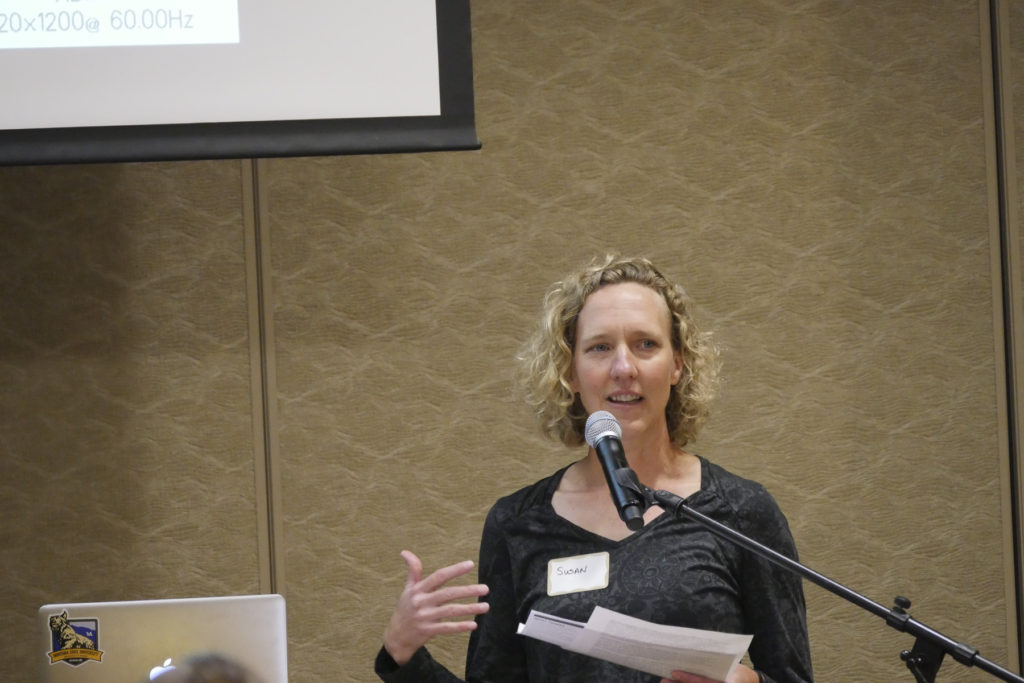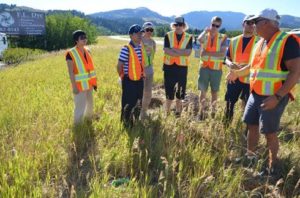WTI Education Program
The Western Transportation Institute (WTI) is a university-based research center at Montana State University with a mission to advance rural transportation through research and education. WTI’s research focuses on rural transportation issues with special attention paid to the areas of safety and operations, winter maintenance and effects, road ecology, infrastructure maintenance and materials, systems engineering development and integration, mobility and public transportation, logistics and freight management, and transportation planning and economics.
 The Western Transportation Institute promotes transportation workforce development by adopting a holistic view of the education-career continuum. WTI targets education and outreach opportunities from K-12 (recruitment) to career-level professional development (life-long learning). A major part of this effort is the management of the West Region Transportation Workforce Center.
The Western Transportation Institute promotes transportation workforce development by adopting a holistic view of the education-career continuum. WTI targets education and outreach opportunities from K-12 (recruitment) to career-level professional development (life-long learning). A major part of this effort is the management of the West Region Transportation Workforce Center.
 The cornerstone of WTI’s Education Program comprises support for experiential learning at the university level. This support sustains multidisciplinary course offerings in transportation, an abundant array of research experiences at both the undergraduate and graduate levels, and opportunities for professional placement and advancement. A rich variety of research opportunities at WTI supplement student coursework by providing students with experiential learning opportunities. Paid student research opportunities are supported through sponsored project work, allowing student research assistants to gain invaluable skills in data collection, analysis, and interpretation and in communicating research results to a broader audience. WTI plays a vital role in helping MSU meet its strategic objective that students integrate learning and discovery through hands on research. Since 2000, 368 undergraduates and 266 graduate students have engaged in paid research opportunities at WTI. This equates to an average of 26 undergraduates and 19 graduate research assistants per year.
The cornerstone of WTI’s Education Program comprises support for experiential learning at the university level. This support sustains multidisciplinary course offerings in transportation, an abundant array of research experiences at both the undergraduate and graduate levels, and opportunities for professional placement and advancement. A rich variety of research opportunities at WTI supplement student coursework by providing students with experiential learning opportunities. Paid student research opportunities are supported through sponsored project work, allowing student research assistants to gain invaluable skills in data collection, analysis, and interpretation and in communicating research results to a broader audience. WTI plays a vital role in helping MSU meet its strategic objective that students integrate learning and discovery through hands on research. Since 2000, 368 undergraduates and 266 graduate students have engaged in paid research opportunities at WTI. This equates to an average of 26 undergraduates and 19 graduate research assistants per year.
Transportation is a multidisciplinary field and students, staff, and projects all benefit from the variety of skills brought to projects from diverse academic backgrounds. Students representing no fewer than 21 academic departments participated on WTI research projects over the past ten years. The majority of undergraduate and graduate research assistants represent the engineering fields –Civil, Mechanical, Industrial, Electrical, and Chemical Engineering as well as Computer Science—although Ecology students also make up a significant portion.
Extensive involvement of both undergraduate and graduate students in innovative and multidisciplinary transportation research at WTI is intended to increase the number, diversity, and quality of students entering careers in the transportation field and reflects the growing need for an expanded variety of expertise at the professional level. Students who gain positive transportation research experience as undergraduates are more likely to continue on to graduate studies and careers in transportation. Recognizing this, WTI supports meaningful academic yearlong undergraduate research opportunities to MSU students that provide one-on-one mentorship and in a large number of cases have resulted in publications and conference presentations co-authored by undergraduates. WTI has additionally hosted three NSF-funded Research Experience for Undergraduates (REU) programs that over a period of nine years provided intensive summer research experiences to 72 undergraduates from colleges and universities nationwide.
Graduate Research Assistants typically conduct research in a relevant area of their major course of study and generally carry out a specific research project which forms the basis for their thesis or dissertation. WTI-sponsored research has resulted in 66 transportation-related Masters degrees and 3 PhDs since 2001. Job placement data shows that transportation graduates are feeding the transportation workforce pipeline, with 61% entering careers in engineering consulting, 19% pursuing research or academic careers, 11% entering government careers, and 9% going into private enterprise.
To attract and prepare students for careers in the transportation field, WTI sponsors a variety of student professional development activities. WTI supports student participation at professional conferences to expose students to the latest developments in transportation research and to facilitate student interaction and networking with professionals in the field. Additional professional development activities include support for technical field trips, professional speakers programs, expanded transportation course offerings, transportation student chapter activities, and hosting a monthly student transportation research forum.
A comprehensive K-12 outreach program exposes and excites primary and secondary school students to opportunities in the transportation field. Outreach efforts range from short hands-on workshops with second graders to multi-week intensive residential programs for high school students (Summer Transportation Camp). Outreach programs are designed to spark interest in transportation issues, to enhance creative thought and problem-solving skills, and to encourage youth to consider transportation academic programs and careers.
Since 2003, over 1,200 K-12 students have participated in outreach events led by WTI staff and students. By engaging MSU students, faculty and staff in K-12 outreach activities, the full power of the institution to change lives is realized. Over 225 MSU engineering students have participated as leaders on WTI-sponsored K-12 outreach activities. WTI’s outreach programs additionally focus particular attention on underserved and minority populations in an effort to diversify and enrich the transportation workforce of the future. Outreach program and event recruitment primarily concentrates on increasing girls’ and Native American interest in engineering programs and careers. This focus on diversity extends to all of WTI’s education initiatives and has proven effective. In a field where women hold a 13% representation in the workforce, 32% of WTI’s Advanced Transportation Graduate Fellowship recipients were women, 60% of UTC Student of the Year nominees from WTI were women, and 53% of REU participants were women.
